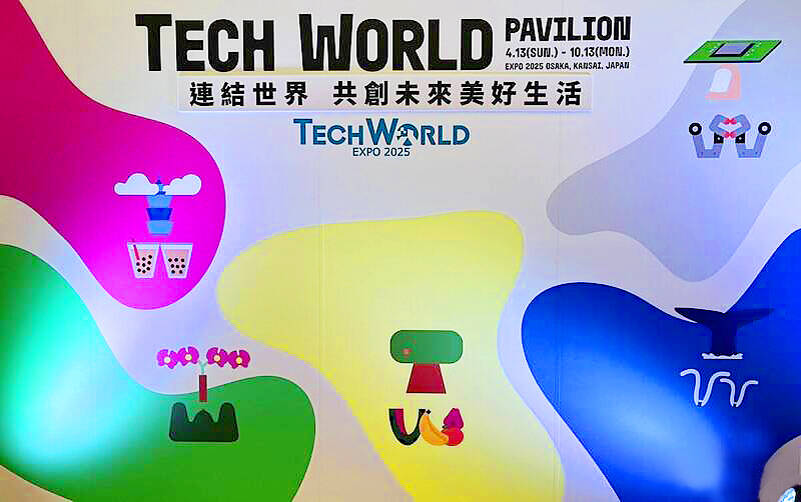Taiwan’s pavilion at the Expo 2025 in Osaka, Japan, from April 13 to October would feature smart technologies using artificial intelligence (AI) developed by Taiwanese suppliers, according to the Taiwan External Trade Development Council (TAITRA).
The expo is an international exhibition held every five years, at which nations showcase their latest innovations across a wide range of industries, including, but not limited to, technology.
Taiwan’s pavilion — “Tech World” — cost NT$2 billion (US$60.21 million), and would showcase a variety of smart technologies and products developed by companies such as Asustek Computer Inc, AUO Corp and Hiwin Technologies Corp, TAITRA said in a statement.

Photo: Taipei Times
The pavilion’s centerpiece would be a giant cylindrical screen displaying the nation’s diverse ecological landscapes, surrounded by 560 laptop computers individually held by mechanical swing arms that can move while displaying images, TAITRA said.
Amid the AI revolution, in which Taiwan’s industries and supply chains play a crucial role, the tech pavilion would also feature multimedia theaters to offer visitors an interactive and immersive experience through display technologies, it added.
Visitors to the TechWorld pavilion would be able to take a virtual tour of Taiwan and, with the help of a smart bracelet and AI algorithms, receive customized trip suggestions based on their reactions to the virtual journey.
According to TAITRA, the Tech World pavilion was designed by Taiwan-based architects MAYU in collaboration with Japan’s Azusa Sekkei. Its design was inspired by Taiwan’s mountains, symbolizing the richness and diversity of its culture and ecology.
It also represents global collaboration, fostering creativity and endless possibilities, TAITRA said.
The Taiwanese pavilion would be officially opened on April 22, a little over one week after the start of the Expo 2025, which is to run until Oct. 13.

TRAFFIC SAFETY RULES: A positive result in a drug test would result in a two-year license suspension for the driver and vehicle, and a fine of up to NT$180,000 The Ministry of Transportation and Communications is to authorize police to conduct roadside saliva tests by the end of the year to deter people from driving while under the influence of narcotics, it said yesterday. The ministry last month unveiled a draft of amended regulations governing traffic safety rules and penalties, which included provisions empowering police to conduct mandatory saliva tests on drivers. While currently rules authorize police to use oral fluid testing kits for signs of drug use, they do not establish penalties for noncompliance or operating procedures for officers to follow, the ministry said. The proposed changes to the regulations require

Taipei, New Taipei City, Keelung and Taoyuan would issue a decision at 8pm on whether to cancel work and school tomorrow due to forecasted heavy rain, Keelung Mayor Hsieh Kuo-liang (謝國樑) said today. Hsieh told reporters that absent some pressing reason, the four northern cities would announce the decision jointly at 8pm. Keelung is expected to receive between 300mm and 490mm of rain in the period from 2pm today through 2pm tomorrow, Central Weather Administration data showed. Keelung City Government regulations stipulate that school and work can be canceled if rain totals in mountainous or low-elevation areas are forecast to exceed 350mm in

1.4nm WAFERS: While TSMC is gearing up to expand its overseas production, it would also continue to invest in Taiwan, company chairman and CEO C.C. Wei said Taiwan Semiconductor Manufacturing Co (TSMC) has applied for permission to construct a new plant in the Central Taiwan Science Park (中部科學園區), which it would use for the production of new high-speed wafers, the National Science and Technology Council said yesterday. The council, which supervises three major science parks in Taiwan, confirmed that the Central Taiwan Science Park Bureau had received an application on Friday from TSMC, the world’s largest contract chipmaker, to commence work on the new A14 fab. A14 technology, a 1.4 nanometer (nm) process, is designed to drive artificial intelligence transformation by enabling faster computing and greater power

China Airlines Ltd (CAL) yesterday morning joined SkyTeam’s Aviation Challenge for the fourth time, operating a demonstration flight for “net zero carbon emissions” from Taiwan Taoyuan International Airport to Bangkok. The flight used sustainable aviation fuel (SAF) at a ratio of up to 40 percent, the highest proportion CAL has achieved to date, the nation’s largest carrier said. Since April, SAF has become available to Taiwanese international carriers at Taipei International Airport (Songshan airport), Kaohsiung International Airport and Taoyuan airport. In previous challenges, CAL operated “net zero carbon emission flights” to Singapore and Japan. At a ceremony at Taoyuan airport, China Airlines chief sustainability